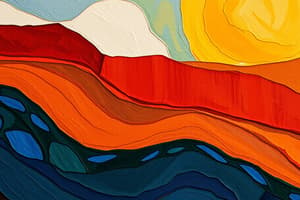Podcast
Questions and Answers
The planet that we call Earth has how many layers?
The planet that we call Earth has how many layers?
Four
What are the four layers of the Earth?
What are the four layers of the Earth?
- Inner Core (correct)
- Mantle (correct)
- Crust (correct)
- Outer Core (correct)
What is the thickest layer of the Earth?
What is the thickest layer of the Earth?
Mantle - 1,800 miles
What is the thinnest layer of the Earth?
What is the thinnest layer of the Earth?
How many miles would you have to dig to reach the other side of the Earth?
How many miles would you have to dig to reach the other side of the Earth?
Match the following facts with the Earth's crust:
Match the following facts with the Earth's crust:
The crust and the upper layer of the mantle together make up a zone of rigid, brittle rock called what?
The crust and the upper layer of the mantle together make up a zone of rigid, brittle rock called what?
What are some amazing facts about the mantle?
What are some amazing facts about the mantle?
What are convection currents?
What are convection currents?
Name two metals found in the outer core.
Name two metals found in the outer core.
How many kilometers beneath the crust is the border between the outer core and the inner core?
How many kilometers beneath the crust is the border between the outer core and the inner core?
The inner core is under so much pressure that it does not move like a liquid; it is what?
The inner core is under so much pressure that it does not move like a liquid; it is what?
What causes tectonic plates to move?
What causes tectonic plates to move?
What is the temperature of the center of the Earth?
What is the temperature of the center of the Earth?
Why is the inner core solid if it is the hottest layer?
Why is the inner core solid if it is the hottest layer?
List two differences between the continental crust and oceanic crust.
List two differences between the continental crust and oceanic crust.
The crust of the Earth is broken into many pieces called what?
The crust of the Earth is broken into many pieces called what?
Flashcards are hidden until you start studying
Study Notes
Earth’s Layers Overview
- Earth is composed of four distinct layers: Inner Core, Outer Core, Mantle, and Crust.
Layer Thickness
- Mantle is the thickest layer, measuring approximately 1,800 miles (2,900 km).
- Crust is the thinnest layer, ranging from 3 to 25 miles (5 to 40 km) in thickness.
Digging Through Earth
- Total distance to dig through all layers: 12,980 km (6,490 km each way).
- Calculation involves the combined thickness of the Crust, Mantle, Outer Core, and Inner Core.
Earth’s Crust Facts
- Crust is made up primarily of Silicon (Si) and Aluminum (Al).
- Contains tectonic plates, supporting continents and oceans.
- Comprises two types: oceanic crust (thinner, denser) and continental crust (thicker).
Lithosphere
- The lithosphere includes the crust and the uppermost layer of the mantle, characterized by rigid and brittle rock.
Mantle Insights
- The mantle is solid but behaves like a flowing substance, akin to fudge.
- Convection currents in the mantle drive tectonic plate movements, affecting the Earth's surface.
- Composition includes Magnesium (Mg), Silicon (Si), Oxygen (O), and Iron (Fe).
Convection Currents
- Process driven by hot mantle material rising, cooling, and sinking, creating a continuous cycle that influences plate tectonics.
Core Composition
- Outer core is comprised mainly of Iron and Nickel.
- The boundary between the outer and inner core lies approximately 5,150 km beneath the Earth’s crust.
Inner Core Properties
- Despite being the hottest layer at approximately 6,650 degrees Celsius, the inner core is solid due to immense pressure from the surrounding layers.
Differences in Crust Types
- Oceanic crust is denser and thinner compared to the less dense and thicker continental crust.
Asthenosphere
- The crust floats on the soft, semi-rigid layer known as the asthenosphere, which allows for the movement of tectonic plates.
Studying That Suits You
Use AI to generate personalized quizzes and flashcards to suit your learning preferences.




